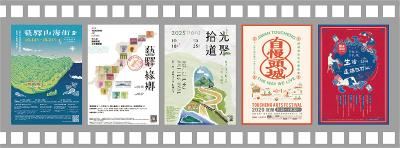2025-10-29
(Courtesy of Taiwan Panorama October 2025)
Esther Tseng /photo by Jimmy Lin /tr. by Phil Newell
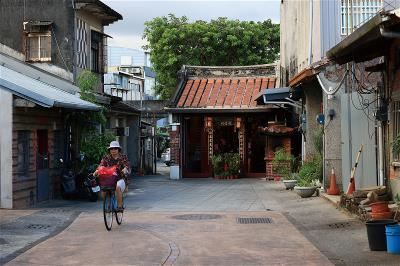
Toucheng in Yilan County is known as the county’s oldest town, and its Old Street, only 600 meters long, has the highest concentration of cultural heritage of any place in Yilan. It is the center of the maritime culture that arose among the area’s five fishing harbors.
As times have changed, Toucheng has been reenergized after a period of decline. The Ghost Grappling Competition held during the seventh month of the lunar calendar, the Toucheng Art Festival, now in its tenth year, and the influx of surfers and immigrants over the years have made Toucheng diverse yet calm, bustling yet tranquil.
The Haifeng tourist train launched recently by Taiwan Railway, which runs from Taipei to Yilan, includes Toucheng as a stop. A Toucheng-based regional revitalization group named Goldfish Space has arranged for passengers to get guided tours of Heping Street (Toucheng’s “Old Street”) and take rubbings of stone tablets, and many visitors are surprised by the township’s cultural richness.
Goldfish Space founder Peng Renhong highlights Toucheng’s special character in just a few sentences: Old Street is the oldest commercial street in the Lanyang Plain; the township boasts seven train stations (the most of any township in Taiwan) and five fishing harbors; and it is home to one of the world’s “12 cool naturally shaped islands,” Guishan Island, as well as an emerging surfing beach. It is a blend of old and new.
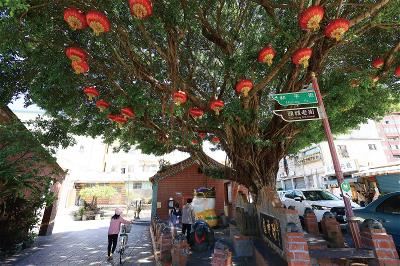
The decline of Yilan’s first town
Toucheng was the first settlement of Han Chinese when they initially pioneered the Lanyang Plain. Lin Zhengfang, former head of research and collections at the Lanyang Museum, says that it only took about 20 years for the plain, previously dominated by the Kavalan indigenous people, to become a mainly Han Chinese society.
Whether entering or leaving Yilan via the Caoling Historic Trail, Toucheng long served as the county’s gateway to the outside world. Wushi Port was the main harbor for Yilan’s external trade back in the Qing Dynasty, making Toucheng the area’s most important commercial center. The exploitation of fishing grounds around Guishan Island and elsewhere kept Toucheng prosperous and growing.
However, “all that is left in Toucheng today is history,” says Lin Zhengfang, formerly editor-in-chief of Annals of Yilan City and Continuing Studies in the Annals of Toucheng Township, not mincing his words.
He explains that siltation in Wushi Port caused it to lose its status as Yilan’s leading commercial harbor, while the opening of the railroad ended Toucheng’s days as a major transportation hub. Nonetheless, one can still find all kinds of cultural heritage on Toucheng Old Street.
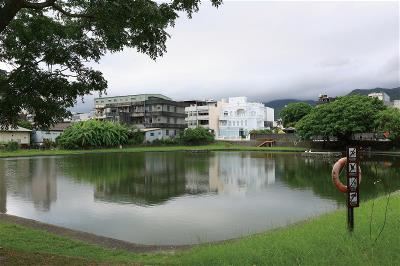
Rescuing cultural heritage: Shiyun Lake
Lin, who has for many years been active in the movement to save local cultural assets, adds that Old Street is testimony to the evolution of the Cultural Heritage Preservation Act.
For example, the Toucheng landmark Shiyun Lake, in front of the Lu Family Residence, is a successful example of the protection of cultural heritage. Beneath the shade of large banyan trees, people fish and cook sausages, while four big white geese sun themselves on rocks, creating a casual and tranquil mood.
However, few people know about the turbulence surrounding efforts to save this pond back in the day. This body of water, named Shiyun Lake by Yilan’s first popularly elected county magistrate, Lu Tzuan-hsiang, was owned by the Lu family, but the magistrate wanted to keep it open to the public. It is believed to be the site of the Qing-Dynasty Touwei Harbor, and many people in Toucheng see it as a spot with excellent fengshui.
Despite this status, descendants of the Lu family mortgaged both the residence and the pond to cover losses from stock trading, and didn’t pay even the interest for many years, until the bank prepared to auction the properties off. The bank first notified the cultural authorities, and the Yilan County Government quickly designated the residence a historic site, but without including the pond.
The pond was bought at auction by a construction company, which in 2009 prepared to fill it in. This caused a protest from local residents, and the pond was also designated as a cultural heritage site by the county government.
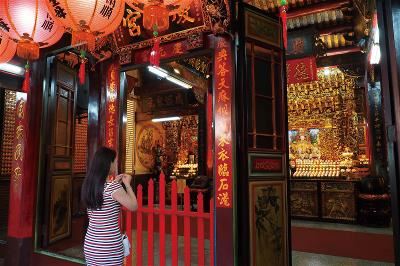
Memories of maritime culture
In recent years, the Yilan County Government has been implementing a “Five Fishing Villages of Toucheng” revitalization plan. The aim is to build brand identity for a “slow life” culture in the five communities of Shicheng, Dali, Daxi, Gengfang, and Wai’ao, and give them a new look.
All five villages lie within Toucheng Township, and Lin Zhengfang points out that the street of 13 former Qing-Dynasty shop houses (of which only two remain) next to the Lu Family Residence is also part of the memories of Toucheng’s maritime culture.
Citing the research of historian Hsu Cho-yun, Lin says that very early on the Lanyang Plain had an export-oriented agricultural economy. This means they not only grew enough rice to feed themselves, but a surplus for export. Yang Tingli, a Qing-Dynasty prefect of Taiwan, wrote a poem describing how vessels had to hurry to load cargo at high tide in the middle of the night.
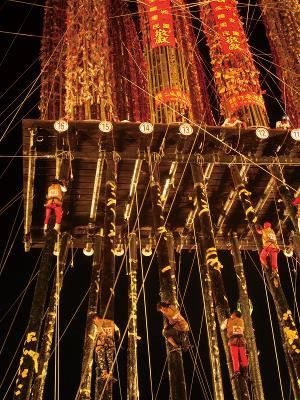
Qianggu and maritime culture
The Toucheng Ghost Grappling Competition (Qianggu Festival) is based on the wish to help all wandering ghosts to find salvation or “cross over” into the next world. Lin Zhengfang suggests that it has a definite connection to maritime culture. For example, people often ask why the poles that are climbed during the competition are so tall, and the answer is that they were originally made from masts salvaged from sunken ships.
Also, one of the most important rituals at the Qianggu Festival, the “release of water lanterns,” is the most visually appealing of all water-lantern rituals in Taiwan, because only in Toucheng is it held at an estuary. The seafood offerings included among the various offerings hung on the 13 spires of the qianggu platform represent the coastal aquaculture industry of Zhongyuan Community.
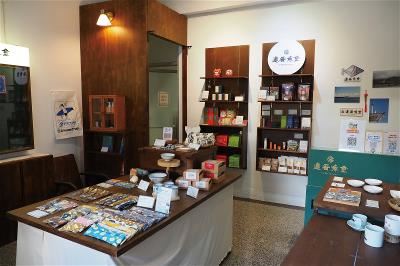
It all started with an old house
The Toucheng Art Festival, which is equally famous with the Qianggu Festival, is organized by Goldfish Space, a regional revitalization group that has existed in Toucheng for a decade. The group’s director, Peng Renhong, is obviously enthusiastic about his hometown, but the fact is that it all started because of an “old house.”
Peng heard that the former residence of the old mayor Qiu Jinyu was going to be torn down to put up a parking lot. Instead, to preserve it, Peng rented it and gave it the name “Goldfish Space” (Mayor Qiu’s given name, Jinyu, literally means “goldfish”).
Goldfish Space enabled Peng to stay in Toucheng and become a small-town enterprise facilitator. Calling itself a “small-town ministry of foreign affairs,” Goldfish Space has promoted bilingual foreigner-friendly shops and offered classes in English while helping foreigners to found businesses in the township. It also holds the Toucheng Art Festival every October, and publishes a single-sheet newspaper called News32 in English to introduce local businesses and artisans (the newspaper’s Chinese name is Jinyudao, meaning “Goldfish Island”).
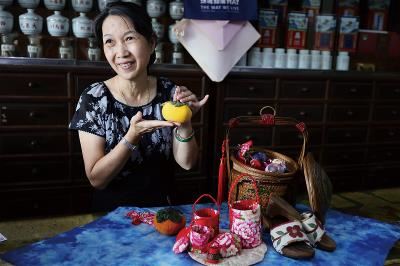
Toucheng’s strengths
The first year, Peng, as a “youth returning to the countryside,” met the illustrator Huang Xing-fang, who had also returned to his hometown after working in the city. Huang, who uses the pen name “Martin,” had directed a Disney animated video. The two supported each other in organizing the art festival as a way to express their attachment to Toucheng.
Peng Renhong has recruited a wide range of artisans and artists who are representative of Toucheng to join in the festival. For instance, he has included calligraphy by Kang Runzhi, a fourth-generation artist from a famous family of calligraphers; patchwork cloth artworks expressing Kavalan and qianggu culture, as well as mini “gratitude baskets,” made by Lai Shuzhen, granddaughter-in-law of Xue Jinzai, the founder of De’an Tang Traditional Chinese Medicine Pharmacy, which Lai uses to introduce Xue’s collection of such baskets; and the artsy decorative metal lattices made by Xu Hongda, a second-generation maker of metal door and window lattices whom Peng calls “Toucheng’s Takuya Kimura” and who is also in charge of the deities’ costumes for activities at Xing’an Temple.
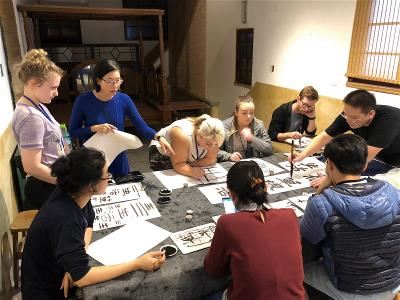
A foreigner-friendly township
Huang Xing-fang tells us: “There is a foreigner here in Toucheng who is also called Martin.” Peng Renhong discovered that Martin Musaubach, who was nominated for a 2017 Golden Melody Award, wanted to become a Toucheng resident, but didn’t know how to arrange things.
Musaubach, an Argentinian who had performed in China, came to Taiwan after getting to know a Taiwanese music producer. He was searching for a place with cheap housing, near the coast, not too far from Taipei, and conducive to creative work. Because Musaubach’s wife hails from a fishing village in Argentina, they sought out fishing villages on Google, which led them to Dali in Toucheng Township.
Peng began to help Musaubach ask around in 2020. “I never expected that I would end up running round in circles. The staff at the Household Registration Office were inexperienced, and even suggested that Martin marry a Taiwanese woman.” At that time Musaubach already had children.
Musaubach finally gained Taiwanese citizenship in 2022. Immediately after getting his ID card, he was invited, as a “new Taiwanese,” to perform at a music festival in India. In 2023, when Goldfish Space hosted the Asia‡Pacific Social Innovation Summit, he composed the theme music. And in 2024, the Ministry of Culture invited him, along with other musicians including Abao (Aljenljeng Tjaluvie), to perform at the Paris Cultural Olympiad.
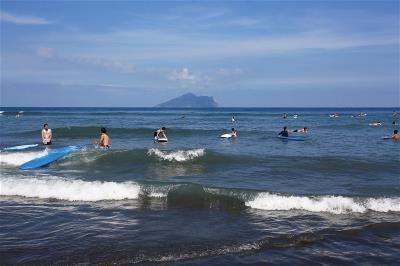
A good place to live and work
Peng notes that as a member of a youth advisory board in the Executive Yuan, when his role was to convey the needs of rural young people to the central government, he discovered that many foreigners found Toucheng appealing for its quality of life, but needed help settling down there. Taking Musaubach, for example, Peng helped him overcome bureaucratic hurdles and get his ID card so that he could live and create in Toucheng with peace of mind.
Neil Roe, founder of the Mu Surf wooden surfboard workshop, which has been around for over 17 years now, is representative of start-up entrepreneurs. He always wanted to find a place suitable for a workshop where he could turn discarded wood materials and recycled surfboards into customized surfboards.
Peng Renhong relates that after searching for more than a year, Roe finally found former karaoke premises on a hillside in Gengfang suitable for a workshop. But he still needed help in setting up and registering his business. Today the workshop holds surf camps for children, is a designated “youth travel spot,” and has even gotten involved in creative activities for the Toucheng Art Festival, for which it will provide English-language guide services this year.
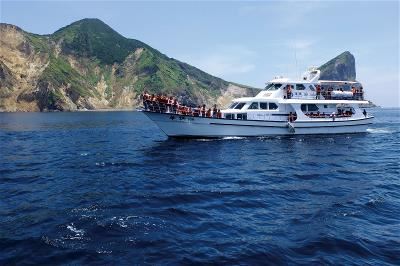
Local development
Foreign craftsmen and musicians like these who have settled in Toucheng not only provide support for the art festival, but have been invited by Peng to teach English to locals and promote tests for graded English certifications for shops. They have also designed bilingual menus for restaurants and Chinese English phrasebooks for business owners.
Peng, who is a member of the board of the Regional Revitalization Council, says that the spirit of local development is “drawing on the locality, using in the locality.”
Suzanne Vares-Lum, president of the East West Center in the US, who delivered a keynote address at the 2023 Asia Pacific Social Innovation Summit, said in a TV interview that after the summit she received a calligraphic scroll by Kang Runzhi. It currently hangs in her office, and she has said that it is the most memorable gift representing the spirit of Taiwan that she has ever received.
Peng says: “Behind the scenes the Art Festival is like a ‘search for missing persons.’ The aim is to find all the interesting people in Toucheng and draw the attention of outsiders to them.”
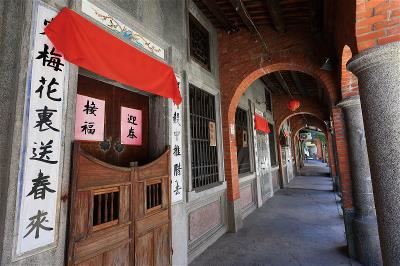
Art festival: An interactive platform
The Toucheng Art Festival has become a platform for interactions between Toucheng and the outside world and has raised the township’s visibility. For example, in 2022 Toucheng and the village of Dulan in Taitung County, similar in having many foreign residents and visitors, surfing, and a high quality of life, invited each other’s emigré artists to take up residence in their own communities.
In 2023 the festival invited Chung Yu-en, a young person who has returned to the countryside to promote regional revitalization in Hualien’s Fuli Township and founded the Manna organic rice products company there; Lin Shu-hao, founder of the co-creative workshop Zhengbin Art in Keelung City; and Chang Ching-yeh, founder of the Kids from Lukang social enterprise, to bring their ideas to Toucheng and engage with local artists.
In 2024 the map of interactive partners was expanded to Japan, as the organizers of the Toucheng Art Festival invited Miyagi Prefecture to engage in exchanges of artists for their festivals. This initiated mutually beneficial interactions between the two locations.
This year’s festival will run from October 18 to 25, 2025. For this event, the tenth, the organizers have invited 20 artisans to gather in Toucheng, and there will be expanded interactions with Miyagi Prefecture. Goldfish Space is also working with Taiwan Railway to use the train stations at Toucheng, Wai’ao, Guishan, and Dali as exhibition spaces with the aim of energizing these small stations.
Peng Renhong quotes the words of his mentor Wu Jing-jyi, a native of Yilan and professor emeritus at National Chengchi University, who exhorted people to stop calling Yilan “Taipei’s back garden.” Instead it should be called “Peach Blossom Spring,” after a Utopia described in an ancient poem, since it is a place that attracts and inspires creative people.
This is the ambience that Goldfish Space hopes visitors to Toucheng will feel.
